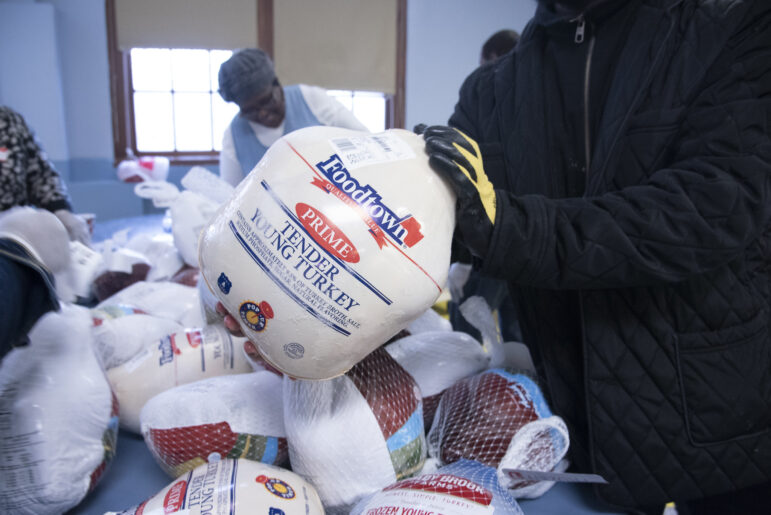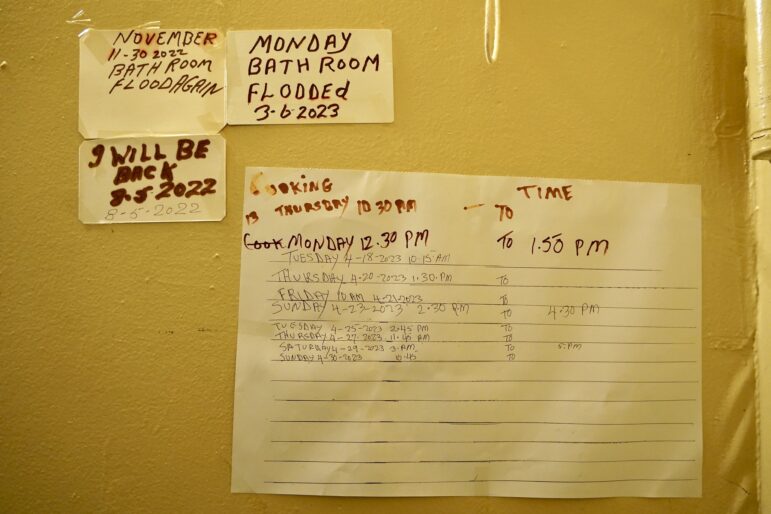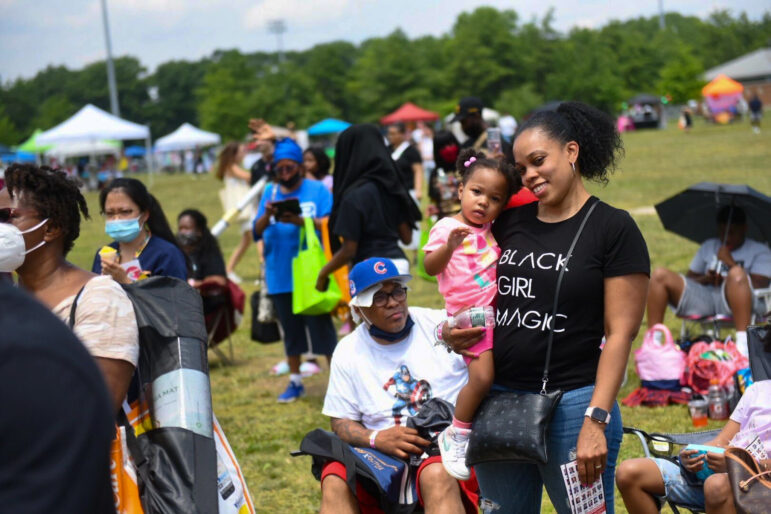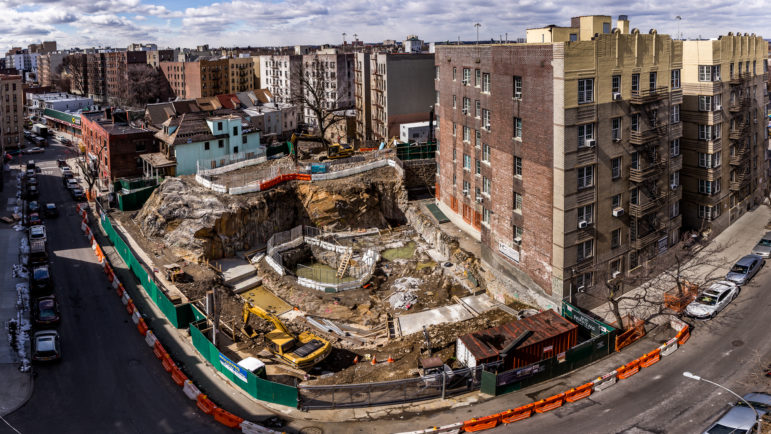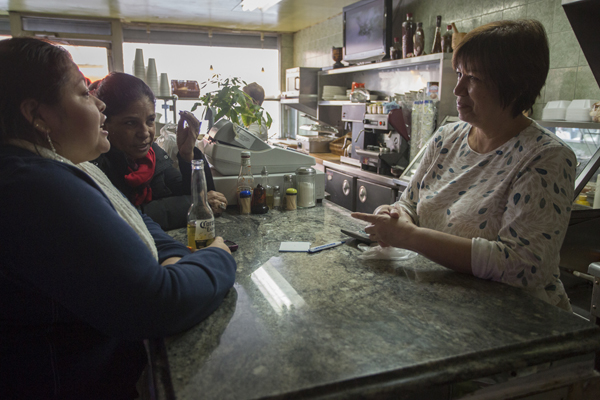
Photo by: Marc Fader
Camaguey Restaurant is a lunchtime hub for mofongo, enchiladas, and other dishes in Mott Haven.
This article is the first installment in The Five Borough Ballot, a collaboration between City Limits, City & State and WNET’s MetroFocus. In each edition of the print and video series, we return to a location in each of the five boroughs to ask real New Yorkers their take on the 2013 election as it unfolds. For a complete overview of the series, go here
Change is palpable in Mott Haven, a neighborhood that over the years has gained notoriety as the poorest congressional district in the country. New condos and housing developments just north of the Hub, the area’s commercial center, reflect one of the Bronx’s biggest building booms.
Population in the 2.8-square-mile area in the borough’s southwestern corner grew by 11.4 percent between 2000 and 2010, nearly three times the borough average. But the area’s recovery from decades of neglect is far from a fait accompli. No neighborhood had its heart ripped out quite as aggressively as Mott Haven’s to feed the city’s 1950’s highway-building frenzy. The Bruckner, Major Deegan and Cross Bronx expressways all crisscross the area, contributing to some of the city’s highest asthma rates. Mott Haven comprises one of the city’s densest clustering of public housing complexes.
In a 2012 report, the Citizen’s Committee for Children, an advocacy group, found that 67.3 percent of all Mott Haven residents and almost three quarters of all children live in “areas of extreme poverty.” On 138th St., one of the neighborhood’s main arteries, spacious bargain outlets and telecommunications storefronts predominate, alongside Dominican and Puerto Rican restaurants that reflect prior immigration waves, and scores of Mexican restaurants run by the latest newcomers. One small eatery that melds Central American and Caribbean staples has stood near the corner of 138th St. and Brook Avenue since 1987.
This year, the people of New York will elect a new mayor, comptroller and public advocate. Four of the five borough presidents will change, as will two-thirds of the City Council. In the hands of the voters is the opportunity to largely refashion the city’s government and the direction of its policies. Consultants have already done their utmost to sow the narratives they hope will grow into victory in the primary and general elections, and insiders have already discarded a host of hopefuls as impossibilities, while elevating others to the status of frontrunners.
But for all of the insights bandied about endlessly in the 24-hour news cycle—the fundraising totals, the endorsements, the numbers, the thundering roar of the horse race—what do the residents of the five boroughs actually think about the elections that will determine who governs them for the next four years?
In order to gain a microcosmic perspective on the real opinions of New Yorkers about the upcoming election, City & State and City Limits, in partnership with WNET’s MetroFocus, present a new series: “The Five Borough Ballot.”
From now until November, we will be following the election from the point of view of five locations: a deli in Manhattan, a NYCHA building in Brooklyn, a bar in Staten Island, a restaurant in The Bronx and a block of homes in Queens.
Each week we will revisit one of these five places to get a grounded angle on the election, as it evolves and escalates toward its ultimate climax. Our goal is not to shape the opinions of our interviewees, but to listen to them—to learn from them what are the issues, stances and personalities that are really resonating with the people of New York—and in so doing, to gain a unique insight into the dynamics of these critical contests.
Will the judgments of the cast of characters at our five locations conform with the prevailing wisdom floated by the press? Will it stand in stark contrast to the spin and the hype? Will it prove the pollsters right?
What is the government that New Yorkers want to see?
Weekdays during lunchtime, diners pack into cozy, narrow Camaguey Restaurant, where they can choose between mofongo, enchiladas, and various seafood and meat stews. At one table on a recent weekday, several diners were animatedly debating which nearby tax preparers could help them get the maximum refund. All said they were scraping by with part-time jobs. None put any stock in next November’s elections to improve their chances of finding full-time work.
“I can’t stand Bloomberg. He ain’t for us. He don’t care about the minority,” said Jesse Rivera, 36, who is on parole after serving nearly 12 years in a number of upstate facilities on gun charges. Rivera said he is mostly focused on helping young people in the neighborhood stay out of the kind of trouble he has been in most of his adult life, by volunteering with an anti-violence initiative.
Factory worker Taesha Pearson, the mother of Rivera’s 12-year-old child, said she would be inclined to vote for City Council Speaker Christine Quinn for mayor in November because Quinn has shown support for Pearson’s plight as a mother whose other child was killed by a stray bullet in 2005. Pearson’s daughter Naesha’s killing has become a galvanizing issue for anti-violence activists in Mott Haven in recent years.
They hold a march every Mother’s Day to support Pearson and other mothers of slain children. Despite their adamancy about taming gun violence, none of the diners at the table were impressed with Mayor Bloomberg’s stance on gun control, which they shrugged off as political opportunism.
Angelica Pizzaro, 27, who works part time as a teller at a local bank, said, “everything is increasing but my pay isn’t going up.” She didn’t know who was running in November, locally or citywide, adding she is uninterested in politics.
One regular customer, Norma Vilarosa, 74, considers herself a Puerto Rican nationalist above all. For that reason, Vilarosa said, she votes, but not for president. Although she respects the incumbent City Councilwomen and Assemblywoman who represent the area, Vilarosa echoed a familiar theme among the lunch crowd at Camaguey: Grassroots advocates, not politicians, offer the best bet for improving residents’ quality of life. She remembered a beloved Mott Haven social justice advocate who died last year as a “brother” for his battles over the decades to defeat city policies and corporate interests many here said would have harmed the neighborhood.
“They’re more important than the politicians,” she said of the advocates, referring to elected officials with a scowl as “vividores,” or opportunists. “They just want your vote.”


